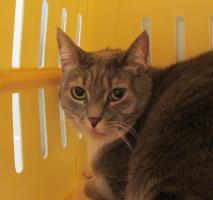The Coughing Cat
- posted: Jul. 23, 2017
 The Coughing Cat
The Coughing Cat
Cats and dogs may experience coughing for a variety of reasons. This week’s blog discusses three common reasons your cat may be coughing, some serious, some minor. And, while many people automatically think “hairball” when their cat is coughing, this is actually the least common reason. Because these conditions can look similar, any cat who is coughing, especially if it is a chronic cough, should be evaluated by your veterinarian. Chest x-rays and other tests may be necessary to determine the cause of your cat’s cough.
- Respiratory infection/tracheitis—cats may develop a cough if they have an upper respiratory infection such as feline herpesvirus, Bordetella (kennel cough) or bacterial sinus infection. Other symptoms include sneezing and watery eyes. Infection of the lungs such as bacterial pneumonia may also cause your cat to cough. Most infections are minor and self –limiting and will resolve on their own, but pneumonia can be serious and some bacterial sinus infections may require antibiotics and supportive care. Take your cat to the vet if he or she has yellow or green nasal discharge, is lethargic, is not eating or has a severe cough and/or open mouth breathing.
- Feline heart disease—cats with congestive heart failure secondary to mitral valve disease or hypertrophic cardiomyopathy (an enlarged, thickened heart muscle) may develop a cough secondary to fluid accumulation in the lungs (pulmonary edema) or due to a big heart pushing on the windpipe. Heart disease can be serious, but in many cases, progression of disease can be slowed with various medications. Symptoms to watch for besides the obvious cough includes open-mouth breathing, collapsing or fainting, decreased appetite and rapid or labored breathing.
- Feline Asthma—allergic bronchitis or feline asthma is a common reason for a chronic or intermittent cough in cats. Similar to human asthma, feline asthma occurs when the airways in the lungs become inflamed, often secondary to inhaled allergens or irritants such as pollen, smoke, or aerosol sprays. Inflammation causes constriction or tightening of the airways and a hoarse, dry, non-productive cough. Some cats may experience a severe, acute asthma attack or asthmatic crisis and can have serious trouble breathing. Cats affected with feline asthma often have changes visible on chest x-rays, but some will have normal films. An acute attack may require oxygen therapy and medications to get your cat breathing normally again. Mild or chronic cases are often treated with oral or inhaled steroids and sometimes with antihistamines or bronchodilators which reduce inflammation and open the airways. Cats with asthma can be taught to use an inhaler-device (assisted by their humans, of course!) called an AeroKatR to deliver inhaled steroids and other medications. An asthmatic crisis is an emergency so if your cat is struggling to breathe, especially if breathing with her mouth open, get to a vet ASAP.
Of course, there are many illnesses that can cause a cough, but these three are commonly seen and can often be identified and treated with a physical exam and some chest radiographs.Though sometimes serious, these conditions are treatable with medications which will help your kitty breathe easier.
This blog brought to you by the Patton Veterinary Hospital serving Red Lion, York and the surrounding areas.
Source: www.veterinarypartner.com
Location
Patton Veterinary Hospital
425 E Broadway
Red Lion, PA 17356
